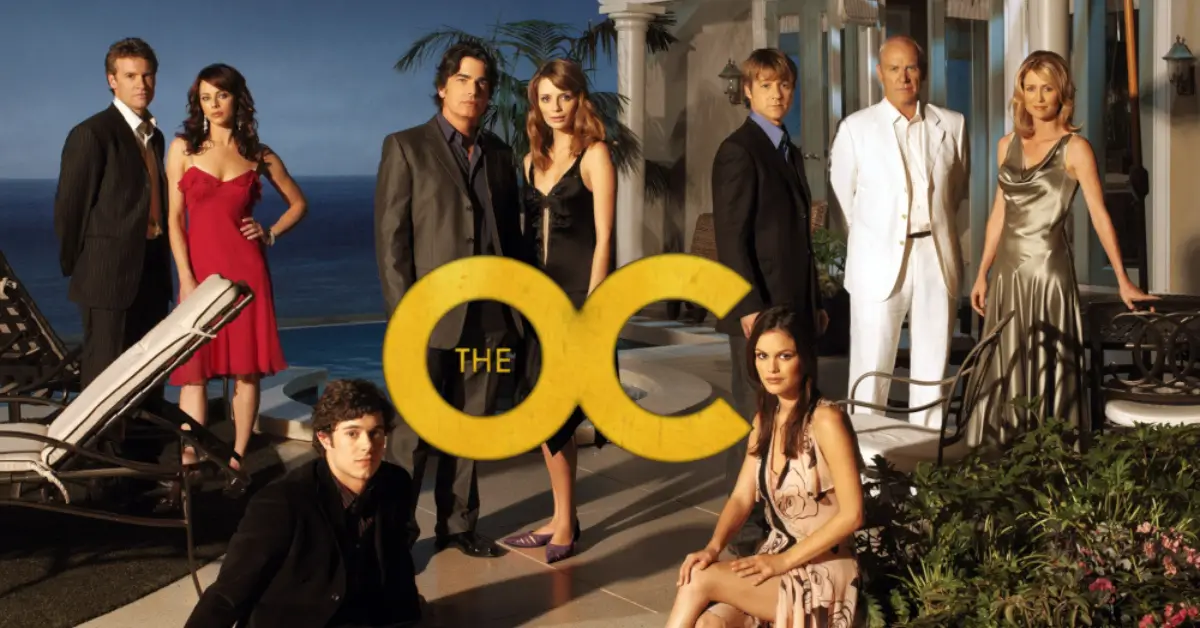The O.C.: A Revolutionary Teen Drama That Redefined Mental Health Representation on Television
In the landscape of early 2000s television, few films impacted the cultural zeitgeist quite like “The O.C.” While technically a television series rather than a feature film, this groundbreaking teen drama deserves analysis for its pioneering approach to mental health representation. Watching “The O.C.” today reveals how the show tackled issues like depression, anxiety, substance abuse, and suicide at a time when these topics remained largely taboo on mainstream television. This post explores how the series both helped and occasionally hindered public perception of mental health struggles through its characters and storylines.
Thank you for reading this post, don't forget to subscribe!Basic Information About “The O.C.”
Title: The O.C.
Release Date & Production Years: August 5, 2003 – February 22, 2007
Creator: Josh Schwartz (who, at 26, became the youngest person to create and run a network series)
Main Cast & Characters:
- Ben McKenzie as Ryan Atwood (troubled teen from Chino)
- Mischa Barton as Marissa Cooper (privileged teen with substance abuse issues)
- Adam Brody as Seth Cohen (socially anxious outsider)
- Rachel Bilson as Summer Roberts (popular girl with hidden depths)
- Peter Gallagher as Sandy Cohen (compassionate public defender)
- Kelly Rowan as Kirsten Cohen (businesswoman struggling with alcoholism)
Genre: Teen drama with elements of comedy and soap opera
Awards: Teen Choice Awards, GLAAD Media Award nomination
Network & Run: Fox, 4 seasons, 92 episodes
Rating: TV-14 (themes of substance abuse, suicide, violence)
Plot Summary: Mental Health Through the Lens of Orange County
“The O.C.” follows Ryan Atwood, a troubled teen from the wrong side of the tracks who is taken in by the wealthy Cohen family in Newport Beach, California. While the series begins as a fish-out-of-water tale, it quickly evolves into a nuanced examination of how privilege and wealth cannot shield individuals from mental health struggles.
Mental Health Themes Depicted:
- Depression and suicide ideation (Marissa Cooper)
- Substance abuse and alcoholism (Marissa Cooper, Kirsten Cohen)
- Social anxiety and identity struggles (Seth Cohen)
- PTSD and trauma responses (Ryan Atwood)
- Parental abandonment and its psychological impact (multiple characters)
Key Turning Points:
One of the most significant mental health moments occurs in Season 2 when Marissa’s struggle with depression and substance abuse culminates in a suicide attempt in Tijuana. This scene marked a departure from how teen movies typically glossed over such serious issues, instead portraying the raw aftermath and intervention that follows such an event.
The show also dedicates substantial time to Kirsten Cohen’s battle with alcoholism, including an intervention and her time in rehabilitation. These storylines weren’t simply dramatic plot devices but ongoing character journeys that showed the reality of recovery as a non-linear process.
Ending Analysis:
Without revealing major spoilers from the series finale, “The O.C.” concludes with a time jump that shows the characters having grown through their struggles. The ending provides a sense of hope while acknowledging that mental health is an ongoing journey rather than a problem to be “solved” by a narrative conclusion.
Setting & Cinematic Techniques
Filming Locations:
The juxtaposition between the idyllic Orange County setting and the internal struggles of its characters creates a powerful visual metaphor. The perfect beaches and mansions serve as a backdrop highlighting how mental illness affects people regardless of socioeconomic status.
Cinematography:
The show employed distinctive visual techniques to portray different mental states:
- Disorienting camera work during Marissa’s overdose scene
- Warm, saturated colors for the Cohen household (representing safety)
- Cold, blue tones during moments of depression and isolation
- Shaky handheld camera during Ryan’s anger episodes
Sound & Music:
“The O.C.” revolutionized television soundtracks, using indie music to enhance emotional moments. Songs like “Hallelujah” (Jeff Buckley) during crisis points and Death Cab for Cutie tracks during Seth’s introspective moments helped audiences connect emotionally with the characters’ mental states.
Acting & Character Portrayal
Lead Performances:
Mischa Barton’s portrayal of Marissa Cooper deserves particular analysis. Her performance of a privileged teenager struggling with depression and addiction brought nuance to what could have been a one-dimensional “troubled rich girl” character. Similarly, Kelly Rowan’s portrayal of Kirsten Cohen’s alcoholism showed remarkable restraint, avoiding melodramatic clichés common in other films about addiction.
Supporting Cast:
The ensemble nature of the show allowed for multiple perspectives on mental health. Peter Gallagher’s Sandy Cohen represented an emotionally available father figure rare in television at that time who modeled healthy communication and support.
Accuracy & Authenticity:
While “The O.C.” sometimes dramatized mental health crises for narrative effect, it generally avoided the worst stereotypes. Characters weren’t “cured” after single breakthroughs, and recovery was shown as an ongoing process with setbacks and progress.
Mental Health Representation: Strengths & Weaknesses
Psychological Accuracy:
The show consulted with psychologists for certain storylines, particularly around Kirsten’s rehabilitation. However, some aspects of treatment were compressed or simplified for television pacing.
Stigmatization vs. Awareness:
“The O.C.” deserves credit for normalizing therapy, as multiple characters attend counseling without it being portrayed as shameful. The Cohen family’s acceptance of Ryan’s anger issues and Marissa’s substance abuse represented a supportive approach rather than stigmatization.
Impact on Public Perception:
Airing from 2003-2007, the show helped bridge the gap between the often-superficial teen dramas of the 1990s and today’s more psychologically nuanced young adult content. It demonstrated that audiences were ready for deeper explorations of mental health in entertainment aimed at younger viewers.
Critical Reception & Cultural Impact
Critics’ Reviews:
Initial reviews focused primarily on the show’s soap opera elements, but later critical reassessment has highlighted its groundbreaking approach to teen mental health issues. The series is now frequently cited as a precursor to more explicit mental health representation in shows like “Euphoria.”
Audience Reactions:
The series developed a devoted following, with many viewers later sharing how the show helped them recognize their own mental health struggles or those of friends. Online communities formed around discussions of the characters’ mental health journeys.
Cultural Impact:
“The O.C.” fundamentally changed how teen-oriented movies and shows approached serious topics. Its willingness to show consequences (rather than just dramatic moments) of mental health crises influenced subsequent shows like “13 Reasons Why,” “Skins,” and “Euphoria.”
The series also normalized discussions of therapy and mental health support among its younger audience, with characters like Ryan eventually embracing therapeutic help despite initial resistance.
Personal Reflection & Final Thoughts
Watching “The O.C.” today reveals both how far we’ve come in mental health representation and what was revolutionary about the show for its time. The series provided genuine emotional impact by showing that mental health struggles could affect anyone from privileged Newport teens to adults at the height of their careers.
The show’s greatest strength was portraying mental health issues as ongoing aspects of characters’ lives rather than “very special episode” plot devices. Viewers watched characters like Seth Cohen grow more comfortable with his identity over multiple seasons, and Kirsten Cohen rebuild her life after acknowledging her alcoholism.
If the series were made today, it might benefit from more diverse perspectives on mental health and more explicit discussions of diagnostic terminology and treatment options. However, for a mainstream network show in the early 2000s, it pushed significant boundaries.
Conclusion
“The O.C.” remains significant not just as a cultural phenomenon but as a turning point in how television approached young adult mental health. By embedding these themes in a glossy, mainstream show set in sunny California, the series highlighted the universal nature of mental health struggles and the importance of support systems.
The show’s legacy lives on in today’s more psychologically complex teen dramas and its influence in destigmatizing mental health conversations cannot be overstated. Whether revisiting the series or discovering it for the first time, “The O.C.” offers valuable insights into both adolescent mental health and how media representation of these issues has evolved.
What are your thoughts on how “The O.C.” portrayed mental health issues? Did certain characters’ journeys resonate with your own experiences or observations?

